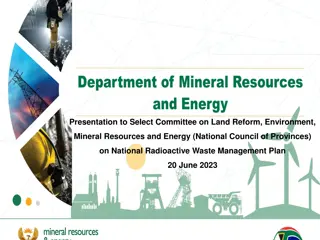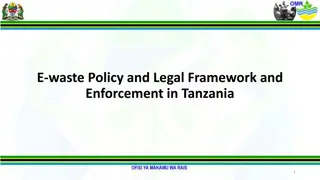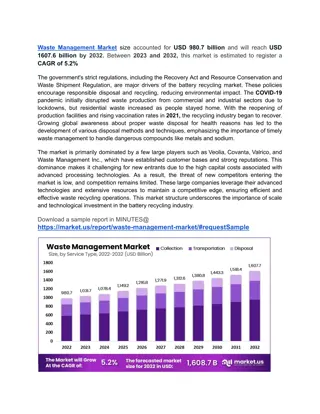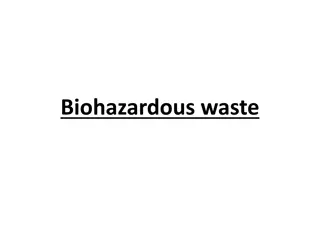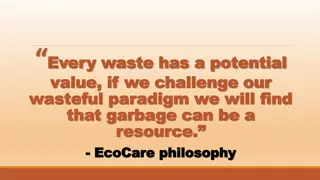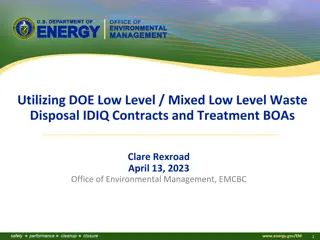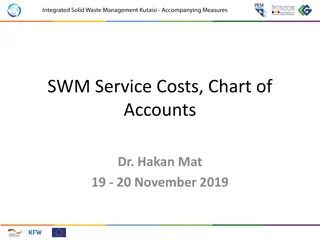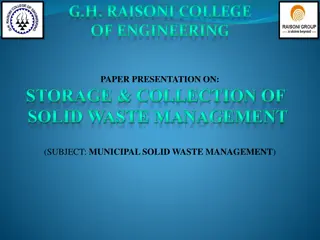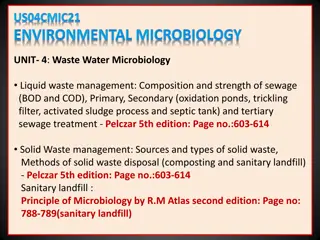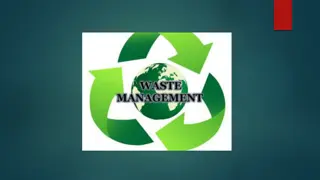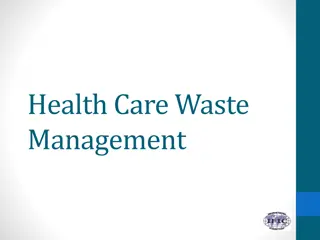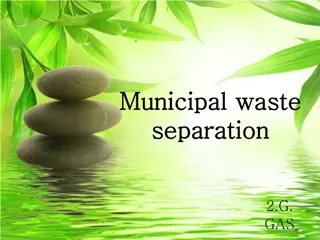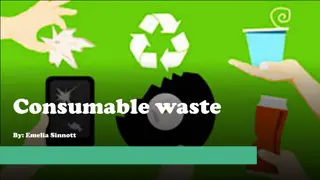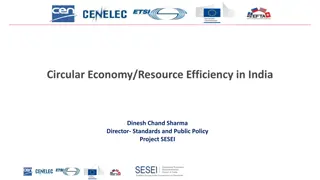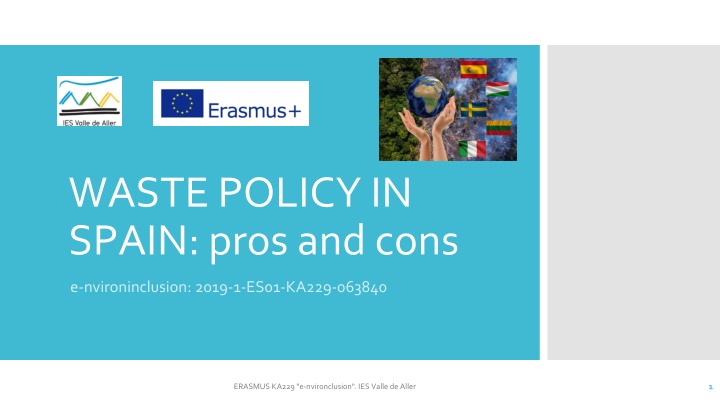
Environmentally Sustainable Practices and Policies in Spain
Explore the pros and cons of waste policy in Spain, emphasizing the need for companies to adopt environmentally friendly practices. The discussion includes questions on pricing disparities between recycled and new materials, bureaucratic hurdles, and the importance of implementing corrective measures to protect the environment. Learn how environmentally correct companies and policies can drive positive change towards sustainability.
Download Presentation

Please find below an Image/Link to download the presentation.
The content on the website is provided AS IS for your information and personal use only. It may not be sold, licensed, or shared on other websites without obtaining consent from the author. If you encounter any issues during the download, it is possible that the publisher has removed the file from their server.
You are allowed to download the files provided on this website for personal or commercial use, subject to the condition that they are used lawfully. All files are the property of their respective owners.
The content on the website is provided AS IS for your information and personal use only. It may not be sold, licensed, or shared on other websites without obtaining consent from the author.
E N D
Presentation Transcript
WASTE POLICY IN SPAIN: pros and cons e-nvironinclusion: 2019-1-ES01-KA229-063840 1 ERASMUS KA229 "e-nvironclusion". IES Valle de Aller
We all agree to change habits and customs acquired with the carefree development of the environment. There are no politicians who claim to be against the environment even though the actions of some show it. There are no companies that advertise their destruction in nature, but there are many that do not apply corrective measures for not often making very small investments in relation to the environmental improvement they would entail. There are market laws derived from market policies that are not understood. 2 ERASMUS KA229 "e-nvironclusion". IES Valle de Aller
Why is recycled paper more expensive than that which comes from pulp of new paper from often illegal felling? Why does recycled plastic have the same price as new plastic from oil? Why are there more bureaucratic obstacles to installing solar panels than to install a diesel tank? Why do polluting products have the same type of VAT as others that serve the opposite? 3 ERASMUS KA229 "e-nvironclusion". IES Valle de Aller
Environmentally correct companies Although some now begin to realize, it has been years since society wants to go in a different direction than the current one. Those that do not evolve towards environmental improvement will be obsolete, as we now see companies that do not have a website. They do not realize that consumer preferences are increasingly opting for socially and environmentally responsible companies. It is necessary to observe the example of the large energy companies that invest in renewable energy to improve their image and continue to control their business sector "energy". It is also necessary that all companies apply corrective measures each in their sector, that is, improve to survive. 4 ERASMUS KA229 "e-nvironclusion". IES Valle de Aller
Environmentally correct policies By lowering the corporate tax for companies that meet previously established environmental criteria, we get these companies to invest more resources in the development of new and better products. A clear example is in renewable energies that increasingly have to be more efficient and economical for mass use. Reducing VAT on products that have a clear social or environmental utility also with previously established criteria, we get users of these products to have them more within reach. There are companies, such as compostadores.com, where requests have been made so that customers do not have to pay 16% VAT for recycling the vegetable remains in their home, since the economic and environmental benefit for society is more than evident. Applying corrective measures in the specifications of the public administration contracts with companies, we have already taken a giant step to exemplify where we should go. A recent example is the requirement of the FSC certificate for wood purchased by some municipalities, the green purchase for office supplies or solar ordinances. 5 ERASMUS KA229 "e-nvironclusion". IES Valle de Aller
Thanks to everyone's collaboration, we have achieved that 78.8% of plastic containers, cans and bricks and paper and cardboard containers are already recycled in Spain. Datos de reciclaje en Espa a This has been possible thanks to the collaboration of almost 47 million citizens, 8,131 municipalities and more than 12,400 companies. A network of 383,974 yellow containers, 217,170 blue containers distributed throughout the Spanish geography (10,000 more than 2017) and more than 37,800 recycling points located in places of high traffic. Thus we have achieved that 99% of Spaniards have access to the selective collection of these, with one container per 162 inhabitants. In 2018, each citizen deposited 15.7 kg of plastic containers, cans and bricks in the yellow container (12.3% more than in 2017) and 18.1 kg in the blue container (+ 12.4% more than in 2017). This represents the largest increase in the contribution since the recycling of packaging was implemented in Spain, demonstrating the citizen's commitment and the proper functioning of the system. 6 ERASMUS KA229 "e-nvironclusion". IES Valle de Aller
7 ERASMUS KA229 "e-nvironclusion". IES Valle de Aller
8 ERASMUS KA229 "e-nvironclusion". IES Valle de Aller
What is recycling? Getting a new product from another waste, or transforming a product that has exhausted its life to obtain another type of matter is what is defined as recycling. Since the 1970s, the production of packaging and disposable products has increased significantly, as has the production of waste, especially in developed countries. 9 ERASMUS KA229 "e-nvironclusion". IES Valle de Aller
The recycling process, in addition to preserving the environment also generates wealth, the most recycled materials are glass, aluminum, paper and plastic. This recycling contributes to a significant reduction in soil, water and air pollution. Many industries are recycling materials as a way to reduce production costs. Cooldown It consists in recovering the product itself to give it a new use. For example, the reuse of office computer equipment, obsolete in terms of benefits, for teaching work. In general, reuse is the form that has the least impact on the environment. Repair and restoration They involve a reconditioning and improvements in product quality. In principle, repair means less effort than restoration. It is also possible to recover certain components to be incorporated into other products. This process has the name of cannibalization. An example of cannibalization can be the recovery of car parts in a scrap yard. 10 ERASMUS KA229 "e-nvironclusion". IES Valle de Aller
Recycling It is commonly called recycling the reuse of materials, that is, the recovery of materials to be used again as raw material in a new manufacturing process. Energy Recovery This alternative consists in extracting, by combustion, the energy content of certain parts of a product. Spill The spill is really not a valid recycling alternative. It could mean the last resort available for the disposal of products at the end of their life. It involves making the product available in a legally controlled landfill. This option is only valid when the product, its parts or its components cannot be reconditioned in any way. It can be a cause of poor quality, legal implications, environmental restrictions or technical-economic infeasibility. 11 ERASMUS KA229 "e-nvironclusion". IES Valle de Aller
WASTE MANAGEMENT: Initially, recycling is born in the product's own manufacturing, a design suitable for recycling is essential for a new product. The fact of including non-polluting elements, recyclable materials, as well as new greener products (such as the electric car) presents the first alternative, the starting point of recycling. The simplification and standardization of materials. Aspects such as the reduction of the volume of materials used, the reduction in variety and the reduction of materials with alloys and compositions that cause difficulties when recycling (for example, plastic and aluminum). Materials should be easily recognizable and easily classified for the subsequent recycling process. There are products in which the only feasible path for this is the marking of the pieces with identification codes. The ease of disassembly Many manufacturing-oriented technologies do not meet this requirement and increasingly produce more types of joints between components of a computer that are not removable. Recycling considerations are oriented in the opposite direction. In addition to the points discussed we could add the need for a strong spare parts market and greater standardization of the components of a team. 12 ERASMUS KA229 "e-nvironclusion". IES Valle de Aller
PROS 13 ERASMUS KA229 "e-nvironclusion". IES Valle de Aller
The amount of jobs it has generated in big cities. Many unemployed seek work in this sector and earn income to support their families. The cooperatives of collectors of paper and aluminum are already a good alternative in the urban centers of many cities of the world. Many educational campaigns have drawn attention to the problem of garbage in big cities. Increasingly, fast-growing urban centers find it difficult to find places to establish garbage dumps. Therefore, recycling is presented as an economically viable solution, as well as being environmentally correct. In schools, teachers should instruct students to recycle garbage in their homes, so that children already grow up knowing the importance of separating what is consumed and then performing the correct recycling. In the long run, and although it may not seem so, this means that in the future the population index that recycles almost naturally will be much higher. 14 ERASMUS KA229 "e-nvironclusion". IES Valle de Aller
Other advantages of waste management: Every 20 kilos of used paper, converted into new paper, prevents a tree from being cut. Think about the amount of paper you have thrown today and imagine how many trees you could have helped preserve. With half a kilo of broken glass, exactly half a kilo of new glass is manufactured. And the great advantage of glass is that it can be recycled endlessly. Energy and raw material savings. Less air, water and soil pollution. It improves the cleanliness of the city, because the resident who gets used to separating the garbage, just throws it on the public road. It generates income by marketing recyclable products. Reduce waste. Create jobs for users of social programs or unemployed people. It gives citizens the opportunity to preserve nature in a concrete way by assuming greater responsibility for the waste they generate. 15 ERASMUS KA229 "e-nvironclusion". IES Valle de Aller
Every 50 kilograms of recycled aluminum used prevents about 5,000 kilograms of bauxite ore from being extracted from the ground. How many cans of soda have you thrown away today? With half a kilo of broken glass, exactly half a kilo of new glass is manufactured. And the great advantage of glass is that it can be recycled endlessly. Energy and raw material savings. Less air, water and soil pollution. It improves the cleanliness of the city, because the resident who gets used to separating the garbage, just throws it on the public road. It generates income by marketing recyclable products. Reduce waste. Create jobs for users of social programs or unemployed people. It gives citizens the opportunity to preserve nature in a concrete way by assuming greater responsibility for the waste they generate. Now also think about landfills: how much material there is, taking up space, and could have been recycled! 16 ERASMUS KA229 "e-nvironclusion". IES Valle de Aller
CONS 17 ERASMUS KA229 "e-nvironclusion". IES Valle de Aller
The limitations of reuse to certain types of products, it is difficult to apply in a generalized way. In large part because of their rapid obsolescence. The recycling of materials produces a certain loss due to their mixing or degradation of their properties. This makes it difficult to create a recycling market. There is a belief that recycled materials are of lower quality than non-recycled materials. Energy recovery is not highly recommended since, in reality, the source of raw materials offered by the waste is not optimally utilized. Some recycling processes throw polluting waste. The combustion process in energy recovery causes a new source of polluting emissions. It must be an activity with a series of strong controls. The growing requirements, legal difficulties and costs that landfills pose for the dumping of products. In itself, it can be seen that the difficulties are rather of a technical or economic nature that make the processes difficult. In short, we could cite recycling as something truly positive and much more when all these problems are overcome, either through new legislation or through public assistance. 18 ERASMUS KA229 "e-nvironclusion". IES Valle de Aller




